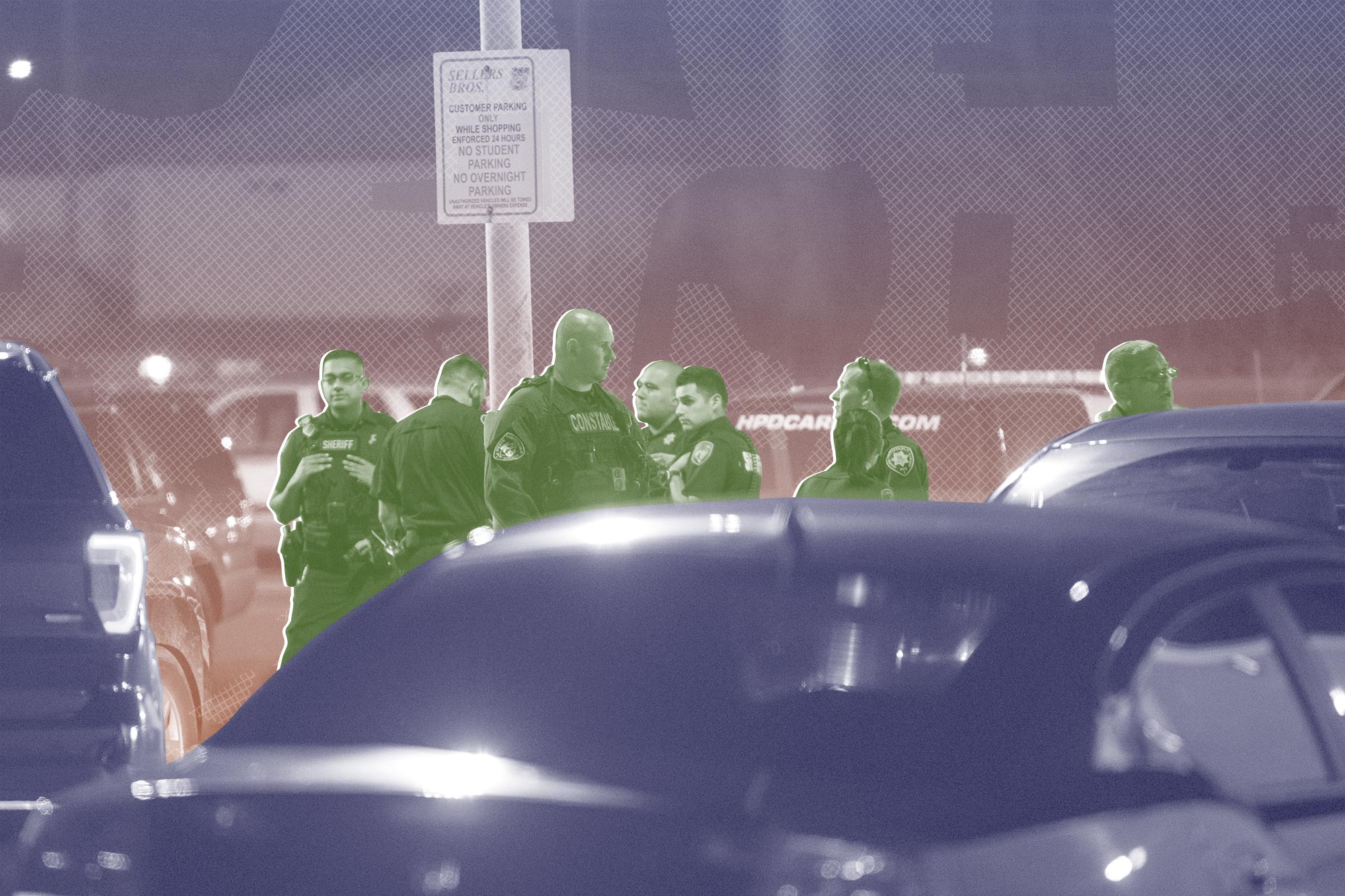Houston Cop Who Led Botched Drug Raid Overwhelmingly Arrested Black People
After a drug bust involving Houston narcotics officer Gerald Goines turned deadly, questions are being raised about how he operated during his time on the force.

Gerald Goines, who as a Houston narcotics cop led a botched deadly drug raid in January, heavily targeted Black people for low-level drug sale charges in majority black neighborhoods, according to arrest data obtained by The Appeal.
In 591 cases in which Goines was the main officer, 94 percent of the defendants were Black, according to case data from the Harris County clerk’s office. The most frequent charge in these cases was “manufacture or delivery of less than 1 gram of a controlled substance,” which represented 23.69 percent, or 140 of the 591 cases.
When these cases are broken down by ZIP Code, the data show that 35 percent of those arrests (205 cases) occurred in five majority Black Houston neighborhoods.
Jay Jenkins, an attorney with the Texas Criminal Justice Coalition, reviewed the data and said he found the fact that more than 90 percent of Goines’s court cases involved a black defendant “genuinely shocking.”
“The dramatic racial disparity in Officer Goines’s court cases is a reflection of HPD’s strategy for enforcing drug laws, which the numbers show us is focused primarily on enforcement in low-income, black and brown neighborhoods,” Jenkins said.
How Goines’s Arrest Data Compare With The Rest Of The Houston Police
Such racial disparities in arrests are not confined to Goines. Data show that in 2017, 80.17 percent of the people arrested by Houston police for sale of less than a gram of controlled substances were Black. Black residents make up approximately 22 percent of Houston’s population.
“While race and poverty are ongoing and legitimate concerns generally for criminal justice reform, Goines’s lengthy career as a respected officer in the community and within his department exemplifies fairness and compassion,” Goines’s attorney, Nicole DeBorde, told The Appeal.
“He cares deeply about the people in his community,” DeBorde said.
Goines, who is Black, worked 34 years for the Houston police, spending most of his career in narcotics enforcement and retired earlier this year.
DeBorde denied that Goines’s supervisors instructed him to target specific neighborhoods or individuals selling small amounts of drugs. She said Goines “went where the tips directed him.”
“Sometimes other officers provided the tips, sometimes concerned citizens did. Goines did not create these tips,” DeBorde said.
When Officer Goines Came Under Fire
In January, Goines and several other officers conducted a no-knock drug raid of a home in Houston’s Pecan Park neighborhood that ended in a shootout in which two people were killed, and five officers, including Goines, were injured.
His squad targeted the home of 58-year-old Rhogena Nicholas and her husband, 59-year-old Navy veteran Dennis Tuttle, after Goines claimed in an affidavit for a search warrant that a confidential informant made a controlled buy of heroin at their house. According to the warrant, Goines’s C.I. told him that he had seen a large quantity of heroin and a 9mm semi-automatic handgun inside the house. However, during the raid police only seized a small amount of marijuana and cocaine, and did not recover the alleged handgun.
The bust made national news when it was reported that Goines’s alleged informant was nowhere to be found. From a hospital bed, Goines told police investigators the name of his C.I., who then spoke to officers and told them that they had never purchased drugs from Nicholas or Tuttle. Investigators went back to Goines, who gave them a different name for the informant. That informant also reportedly denied making the controlled buy. Investigators then spoke to all of Goines’s informants, who said they never purchased drugs from Nicholas or Tuttle.
After the existence of Goines’s informant appeared questionable, Houston Police Chief Art Acevedo said “it appears that there are some material untruths or lies in that affidavit, and that’s a problem. That’s totally unacceptable.”
Acevedo announced that investigators will review 1400 cases—including 27 active cases—involving Goines. While recovering from a gunshot wound to the neck, The department suspended Goines before he decided to retire.
Investigative reporters for Houston TV station KTRK also obtained a copy of Goines’s personnel file, which contained information on dozens of department reviews that Goines had over the course of his career. From 2007 to 2011, Goines’s supervisors noted he “utilizes confidential informants to a positive end.” In a review last August, his supervisors called Goines a “mentor to new narcotics investigators” while also stating that he needed “increase his productivity levels.”
Asked to comment on the Goines investigation, police spokesperson Kese Smith referred The Appeal to remarks from Acevedo at two news conferences on Goines that were held earlier this year. During those news conferences, Acevedo called Goines’s actions “totally unacceptable” but continued to claim that the department “had reason to investigate that location.” Smith pointed out that Goines’s cases were already under review in three separate investigations by the department’s internal affairs unit, the FBI, and the Harris County district attorney’s office.
Dane Schiller, a spokesperson for Harris County DA Kim Ogg, confirmed that the DA continues to review “hundreds of cases” involving Goines. So far, Ogg’s office has dismissed three active cases involving the former officer.
DeBorde, has said that her client was voluntarily cooperating with investigators and reached out to them on his own.
